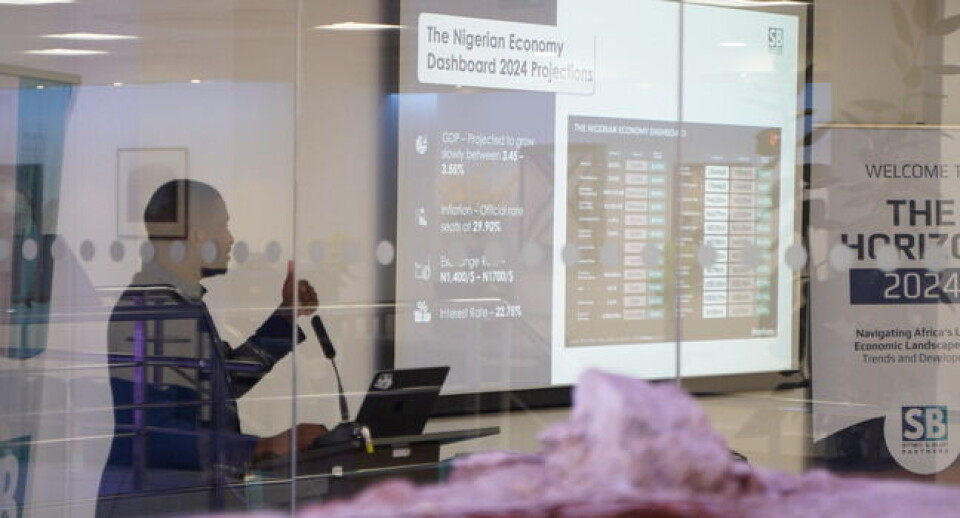Copyright : Re-publication of this article is authorised only in the following circumstances; the writer and Africa Legal are both recognised as the author and the website address www.africa-legal.com and original article link are back linked. Re-publication without both must be preauthorised by contacting editor@africa-legal.com
Navigating Nigeria’s complex investment terrain

Nigeria has made significant strides in leveraging technology to foster economic growth and streamline the legal framework for investments. A recent workshop hosted by Stren & Blan Partners offered a platform for in-depth discussions on Nigeria’s economic and legal landscape.
Stren & Blan Partners, a leading commercial law firm in Nigeria, recently gathered a group of high-level delegates in London to look at investment opportunities in Nigeria and Africa and discuss how to navigate the complex terrain.
In his keynote lecture, Amala Umeike, founding partner of Stren & Blan partners, looked at the latest trends and developments in Africa’s economic and legal landscape.
Amala provided a nuanced overview of Nigeria’s economic status, highlighting that despite facing an inflation rate of 29.9% and an interest rate of 22.75%, Nigeria presents burgeoning sectors ripe for investment.
He also delved into the challenges of capital importation, and discussed recent policy changes aimed at enhancing foreign direct investment (FDI) in Nigeria and across Africa, which mark a pivotal moment for the continent’s economic expansion and integration into the global market.
The energy sector has seen considerable growth over recent years, and the first panel discussion of the day focused on unravelling key obstacles to sustainable investments in the renewable energy, infrastructure and financial services sectors.
A diverse panel comprising Ozioma Agu (Partner; Energy, Finance and Infrastructure, Stren and Blan Partners), Jonathan Thomas (Director; Afrinomica), Joel Singh (Director; GEC Space Program) and Tomas Freyman (Partner; Head of Valuation and Modelling, Grant Thornton) underscored Africa and Nigeria’s significant potential as lucrative locales for renewable energy investments, driven by an abundance of resources and government incentives aimed at gas commercialization and infrastructure development.
Despite the acknowledged potential, panel discussions revealed that sustainable investments in the renewable energy sector face notable challenges. Key obstacles include regulatory uncertainties, funding gaps and infrastructural deficits. However, the government's increased drive to create investment incentives in renewable energy indicates a strong commitment to overcoming these hurdles. The workshop shed light on some of these initiatives such as the Development Bank of Nigeria (DBT) and international trade advisors.
Panellists also talked about critical policy shifts affecting investments in the renewables sector, including the Electricity Act, and discussed ways of de-risking investments in the sector. Joel also shared on the potential for space investments in Nigeria.
The subsequent panel, “Evaluate Investment Policies and Capital Market Trends”, brought to the fore Nigeria’s growing status as a premier investment hub. The panel consisting of Noble Obasi (Team lead; Capital markets, private equity and mergers & acquisition, Stren & Blan Partners), Damir Cimer (Chief operating officer; Scribestar.com), Ariel White-Tsimikalis (Partner; Goodwin Procter LLP) and Shweta Chauhan (Senior trade and investment officer; British Consulate-General Toronto), emphasised the compatibility of the Nigerian and UK legal systems, both grounded in common law, which eases the pathway for international investors.
The discussion covered the importance of clear and consistent policies, enhanced access to financing, and the development of infrastructure to support increased investments in key sectors. The government’s role in facilitating public–private partnerships was highlighted as a crucial factor in bridging the gap and ensuring the delivery of large-scale, transformative projects.
Panellists also highlighted the transformative role of technology in levelling the investment playing field and the importance of navigating macro and regulatory obstacles to leverage Nigeria’s digital transformation for investment.
The emphasis on digitising the investment and legal processes aligns with the global trend towards automation which aims to enhance efficiency, reduce bureaucratic hurdles and improve transparency. This digital shift not only attracts foreign investors, but also promotes a more dynamic and competitive market environment, said the speakers.
As Nigeria continues on its path towards becoming a key investment hub, overcoming these sector-specific challenges will be instrumental in shaping its future.
To join Africa Legal's mailing list please click here
